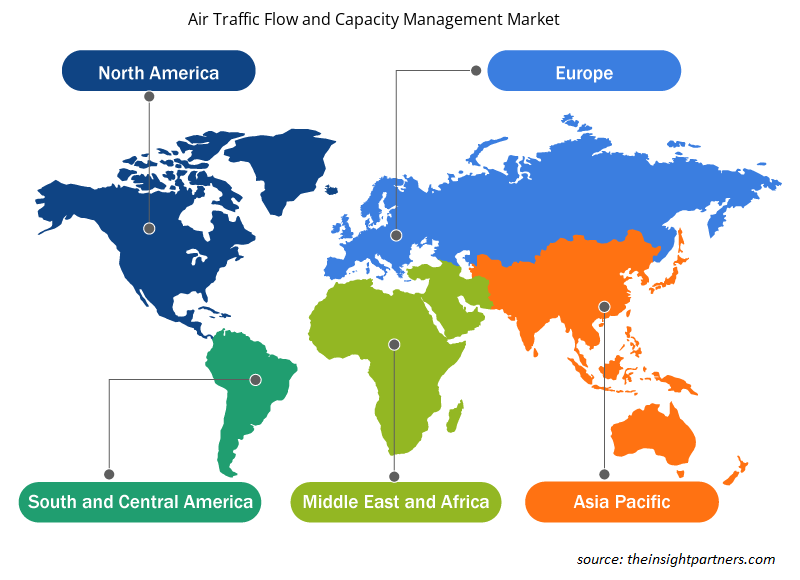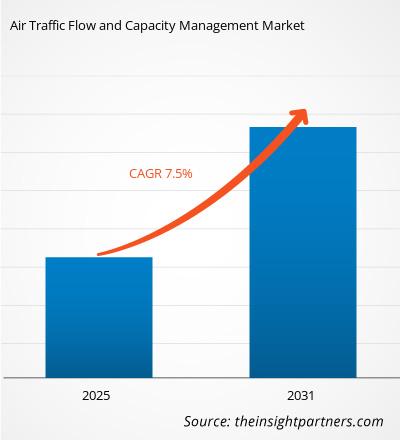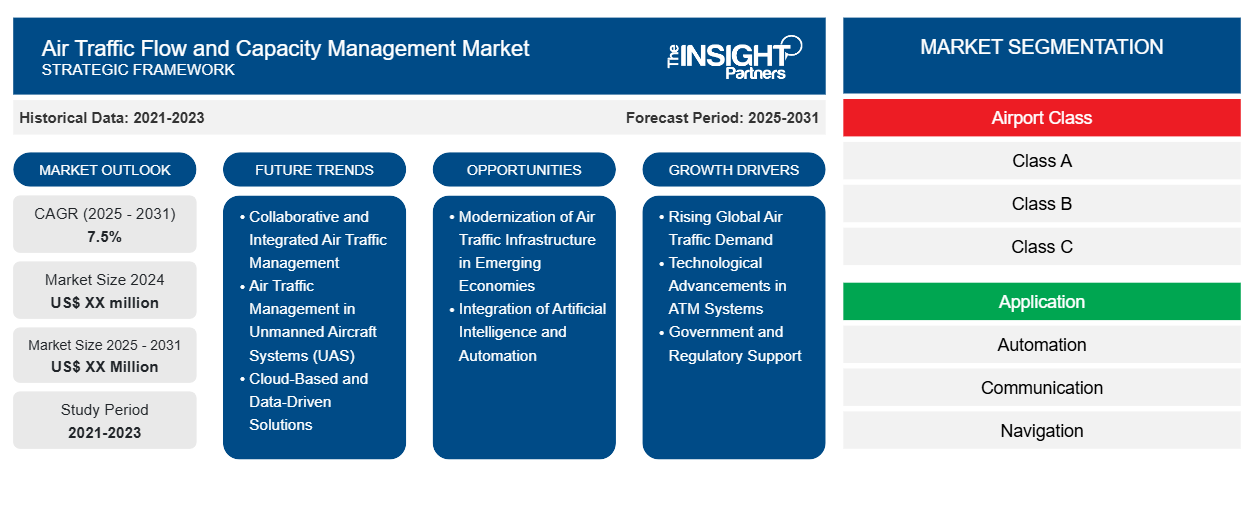航空交通流および容量管理市場は、2023年から2031年にかけて7.5%のCAGRを記録し、市場規模は2023年のXX百万米ドルから2031年にはXX百万米ドルに拡大すると予想されています。
レポートは、空港クラス(クラス A、クラス B、クラス C)、アプリケーション(自動化、通信、ナビゲーション、シミュレーション、監視)、エンドユーザー(民間および商業、軍事および防衛)別にセグメント化されています。グローバル分析は、地域レベルと主要国でさらに細分化されています。レポートは、上記の分析とセグメントに対して USD での価値を提供します。
報告書の目的
The Insight Partners によるレポート「航空交通流とキャパシティ管理市場」は、現在の状況と将来の成長、主な推進要因、課題、機会を説明することを目的としています。これにより、次のようなさまざまなビジネス関係者に洞察が提供されます。
- テクノロジープロバイダー/メーカー: 進化する市場の動向を理解し、潜在的な成長機会を把握することで、情報に基づいた戦略的意思決定が可能になります。
- 投資家: 市場の成長率、市場の財務予測、バリュー チェーン全体に存在する機会に関する包括的な傾向分析を実施します。
- 規制機関: 市場の濫用を最小限に抑え、投資家の信用と信頼を維持し、市場の完全性と安定性を維持することを目的として、市場における政策と警察活動を規制します。
航空交通流とキャパシティ管理市場のセグメンテーション
空港クラス
- クラスA
- クラスB
- クラスC
応用
- オートメーション
- コミュニケーション
- ナビゲーション
- シミュレーション
- 監視
エンドユーザー
- 民事および商業
- 軍事と防衛
地理
- 北米
- ヨーロッパ
- アジア太平洋
- 南米と中央アメリカ
- 中東およびアフリカ
地理
- 北米
- ヨーロッパ
- アジア太平洋
- 南米と中央アメリカ
- 中東およびアフリカ
要件に合わせてレポートをカスタマイズする
このレポートの一部、国レベルの分析、Excelデータパックなど、あらゆるレポートを無料でカスタマイズできます。また、スタートアップや大学向けのお得なオファーや割引もご利用いただけます。
-
このレポートの主要な市場動向を入手してください。この無料サンプルには、市場動向から見積もりや予測に至るまでのデータ分析が含まれます。
航空交通流とキャパシティ管理市場の成長要因
- 増加する世界の航空交通需要: 乗客数と貨物需要の増加に牽引されて世界の航空交通が継続的に増加していることが、航空交通フローおよびキャパシティ管理市場の主な原動力となっています。航空旅行がパンデミックから回復して拡大するにつれて、空港と航空管制サービスプロバイダー (ANSP) は、この流入を管理するために空域と空港のキャパシティを最適化する必要があります。安全性と効率性を維持しながらこの増加に対応するには、スムーズで効果的な運用を確保するための高度な航空交通管理 (ATM) システムが必要です。航空交通量の増加は既存のインフラストラクチャに圧力をかけ、混雑や遅延を回避するためにフロー管理の改善が必要になります。
- ATM システムにおける技術的進歩: 人工知能 (AI)、機械学習 (ML)、自動化、高度なデータ分析の採用などの技術革新により、航空交通管理システムが変革しています。これらの進歩により、航空交通の流れをリアルタイムで最適化し、混雑ポイントをより正確に予測し、利用可能な容量をより効率的に使用できるようになります。航空交通管制塔と高度な飛行管理システムの自動化により、人的ミスが削減され、運用効率が向上し、航空交通の流れと容量管理におけるソリューションのアップグレードの必要性が高まっています。
- 政府と規制当局の支援: 世界中の政府と規制当局は、安全性の向上、遅延の削減、環境効率の改善を目的として、航空交通管理システムの近代化をますます優先しています。欧州のシングル・ヨーロピアン・スカイ (SES) などの規制イニシアチブは、空域の共同かつ統合的な管理を推進しており、航空交通流管理ソリューションへの投資を促進しています。さらに、政府は持続可能性の目標を達成するために、より効率的な ATM システムの開発を奨励し、飛行経路と空域の使用を最適化することで炭素排出量を削減しています。
航空交通流とキャパシティ管理市場の将来動向
- 協調的かつ統合された航空交通管理: 航空交通の流れとキャパシティ管理市場における重要なトレンドは、協調的かつ統合された航空交通管理システムへの移行です。ヨーロッパの SESAR (Single European Sky ATM Research) や米国の NextGen などのイニシアチブは、地域間でシームレスで統合された航空交通管制インフラストラクチャを構築することを目指しています。このコラボレーションにより、航空管制官、航空会社、空港間の連携が改善され、国境を越えた航空交通の流れが改善されます。統合されたシステムにより、リアルタイムのデータ共有が促進され、意思決定が強化され、キャパシティの制約を管理して遅延を減らすことができます。
- 無人航空機システム (UAS) における航空交通管理: ドローンと無人航空機システム (UAS) の台頭は、航空交通流管理を一変させている新たなトレンドです。UAS 交通管理 (UTM) は、これらのシステムでは有人飛行との安全な統合のために専用のインフラストラクチャが必要となるため、航空交通管理市場の不可欠な要素になりつつあります。政府や規制機関は、混雑した空域でのドローンの安全で効率的な運用を確保するために、UTM フレームワークを開発しています。ドローンの商業利用が拡大するにつれて、UTM は航空交通全体の容量を管理する上で重要な部分となり、従来の ATM システムにドローン管理を組み込む傾向が生まれます。
- クラウドベースおよびデータ駆動型ソリューション: 航空交通流およびキャパシティ管理システムでは、クラウドベースのテクノロジーとデータ駆動型ソリューションがますます採用されています。これらのシステムには、拡張性の向上、リアルタイムのデータ アクセス、コスト効率の高い導入など、大きな利点があります。クラウドベースのシステムにより、航空交通管理業務の集中化が可能になり、空港、航空会社、航空管制サービス プロバイダーなど、複数の関係者間の調整が容易になります。データ分析は、航空交通の最適化、混雑ポイントの予測、および過去およびリアルタイムのフライト データの分析による意思決定の改善において重要な役割を果たします。これらのテクノロジーは、より応答性と柔軟性に優れた航空交通管理ソリューションを実現する上で不可欠です。
航空交通流とキャパシティ管理の市場機会
- 新興経済国における航空交通インフラの近代化: 新興経済国、特にアジア太平洋、アフリカ、ラテンアメリカでは、航空交通管理インフラの近代化に多額の投資が行われています。これらの地域で航空交通が増加するにつれ、新しく高度な航空交通フローおよび容量管理システムを導入する絶好の機会が生まれます。これらの地域では、最新の ATM 技術によって空港の容量を増やし、安全性を高め、空域の使用を最適化することを目指しています。航空交通管理の最先端のソリューションを提供する企業は、拡大する航空業界の需要を満たす、拡張可能でコスト効率の高いシステムを提供することで、これらの成長市場を活用できます。
- 人工知能と自動化の統合: 航空交通流管理における AI、機械学習、自動化の統合は、運用効率を大幅に向上させる機会を提供します。AI は膨大な量の飛行データを分析して、交通パターンを予測し、飛行経路を最適化し、リアルタイムで混雑を管理できます。航空交通管制の自動化により、人為的ミスが減り、スループットが向上し、交通量の多い状況でもスムーズな運用が可能になります。AI を活用した航空交通管理ソリューションの開発に投資する企業は、技術革新がますます進む市場で競争上の優位性を獲得できます。
航空交通流とキャパシティ管理市場の地域別洞察
予測期間を通じて航空交通流およびキャパシティ管理市場に影響を与える地域的な傾向と要因は、Insight Partners のアナリストによって徹底的に説明されています。このセクションでは、北米、ヨーロッパ、アジア太平洋、中東、アフリカ、南米、中米にわたる航空交通流およびキャパシティ管理市場のセグメントと地理についても説明します。

- 航空交通流とキャパシティ管理市場の地域別データを入手
航空交通流とキャパシティ管理市場レポートの範囲
| レポート属性 | 詳細 |
|---|---|
| 2024年の市場規模 | XX百万米ドル |
| 2031年までの市場規模 | XX百万米ドル |
| 世界のCAGR(2024年 - 2031年) | 7.5% |
| 履歴データ | 2021-2023 |
| 予測期間 | 2025-2031 |
| 対象セグメント |
空港クラス別
|
| 対象地域と国 |
北米
|
| 市場リーダーと主要企業プロフィール |
|
航空交通流とキャパシティ管理市場のプレーヤー密度:ビジネスダイナミクスへの影響を理解する
航空交通流およびキャパシティ管理市場は、消費者の嗜好の変化、技術の進歩、製品の利点に対する認識の高まりなどの要因により、エンドユーザーの需要が高まり、急速に成長しています。需要が高まるにつれて、企業は提供を拡大し、消費者のニーズを満たすために革新し、新たなトレンドを活用し、市場の成長をさらに促進しています。
市場プレーヤー密度とは、特定の市場または業界内で活動している企業または会社の分布を指します。これは、特定の市場スペースに、その規模または総市場価値と比較して、どれだけの競合相手 (市場プレーヤー) が存在するかを示します。
航空交通流および容量管理市場で事業を展開している主要企業は次のとおりです。
- ALTYSテクノロジーズ
- BAEシステムズ
- フリークエンティス
- エネア
- L3ハリステクノロジーズ株式会社
免責事項:上記の企業は、特定の順序でランク付けされていません。

- 航空交通流とキャパシティ管理市場のトップキープレーヤーの概要を入手
主なセールスポイント
- 包括的なカバレッジ: レポートでは、航空交通流および容量管理市場の製品、サービス、タイプ、エンドユーザーの分析を包括的にカバーし、全体的な展望を提供します。
- 専門家による分析: レポートは、業界の専門家とアナリストの深い理解に基づいてまとめられています。
- 最新情報: このレポートは、最新の情報とデータの傾向を網羅しているため、ビジネスの関連性を保証します。
- カスタマイズ オプション: このレポートは、特定のクライアント要件に対応し、ビジネス戦略に適切に適合するようにカスタマイズできます。
したがって、航空交通流およびキャパシティ管理市場に関する調査レポートは、業界のシナリオと成長の見通しを解読し理解する道の先導役となる可能性があります。正当な懸念事項がいくつかあるかもしれませんが、このレポートの全体的な利点は欠点を上回る傾向があります。
- 過去2年間の分析、基準年、CAGRによる予測(7年間)
- PEST分析とSWOT分析
- 市場規模価値/数量 - 世界、地域、国
- 業界と競争環境
- Excel データセット
最新レポート
関連レポート
お客様の声
購入理由
- 情報に基づいた意思決定
- 市場動向の理解
- 競合分析
- 顧客インサイト
- 市場予測
- リスク軽減
- 戦略計画
- 投資の正当性
- 新興市場の特定
- マーケティング戦略の強化
- 業務効率の向上
- 規制動向への対応























 無料サンプルを入手 - 航空交通流とキャパシティ管理市場
無料サンプルを入手 - 航空交通流とキャパシティ管理市場